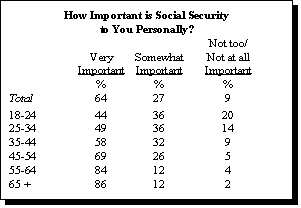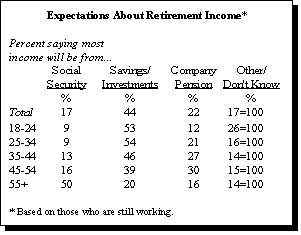Introduction and Summary
President Clinton faces a potentially wide generation gap on his proposal to “fix Social Security first.” Older Americans embrace the idea, but younger people are far more interested in spending any budget surplus on programs that benefit their families today.
Fully 82% of those age 50 and older say making Social Security financially sound should be the No. 1 priority for Clinton and Congress this year. Younger Americans place education first, according to two new nationwide surveys taken by the Pew Research Center in association with Americans Discuss Social Security.
When asked how they would use any budget surplus, fully two-thirds of the public is prepared to spend the money on domestic programs rather than use it for tax cuts or debt reduction. But the spenders divide into two camps: one-third of Americans say the money should be spent to fix Social Security and Medicare (32%) and one-third say the money should be spent on other domestic programs like health care, education and the environment (33%).
Again, the generational differences are stark. A plurality of those age 50 and older would fix Social Security (46%) compared to just a quarter of those under 50 (25%). Those under 50 would spend the money on today’s domestic programs (42%) compared to 16% of older Americans who would do so.
Reflecting these different priorities, Americans also split along generational lines on the role they expect Social Security to play in their own lives. Among working Americans 55 or older, half say Social Security will provide for most of their living expenses when they retire. But barely one-in-ten (12%) workers under 55 feel the same way. Most younger Americans instead are banking on personal savings or a company pension.

At the same time, public support for both Social Security and Medicare remains high across all age groups. Fully 64% said the Social Security program is “very important” to them personally and 57% described the Medicare program as “very important”. While Social Security and Medicare are most important to older people and retirees, nearly eight-in-ten Americans in every age group say both Social Security and Medicare are “very” or “somewhat” important to them personally.
Not Banking on Social Security
Few working Americans expect Social Security will be their main source of income when they retire. Two-thirds of those 35 and older say they have already begun saving money to live on when they retire.

Younger Americans are particularly doubtful that they will benefit from Social Security. Among those under the age of 35, just 9% believe Social Security will be a main source of retirement income, and more than half (61%) say the program will help them get by “only a little” or “not at all” when they retire.
These attitudes are balanced by the concerns of other segments of the population that are counting on Social Security. Substantially more lower-income Americans of all ages expect to rely on Social Security. One-in-four of those who earn under $30,000 expect that Social Security will cover most of their living expenses, for example, compared to just 7% of those earning over $40,000.
Half of those nearing retirement age — 55 and older — also say they expect most of their income will come from the Social Security program and many express concern about their financial situation in the future. Nearly half (49%) of those between the ages of 55 and 64 expect their standard of living will go down when they retire. Similarly, 41% of the 55 to 64 age-group believe they will only have enough money to meet basic living expenses when they retire, compared to just 30% of those under 55. Among Americans who have already retired, 30% say their standard of living has gone down, while 55% say it has stayed the same.
Policy Makers Out of Touch
Americans of all generations, however, think political leaders are out of touch with their views of Social Security. Nearly three-in-four Americans (71%) say the nation’s policy makers don’t understand how people feel about Social Security. Almost as many (57%) believe political leaders only care “a little” or “not at all” how people feel about the program. Similarly, majorities say policy makers don’t understand or care how people feel about Medicare.
Politicians do not bear the full brunt of public frustration on the Social Security issue, however — the media also gets its share of criticism. Two-thirds of Americans (65%) give news organizations a rating of “fair” or “poor” for their reporting about Social Security. In addition, majorities say there has been too little coverage of the issue (51%) and describe this coverage as “mostly confusing” (52%).
News Interest Highs and Low
The public’s attention to news about Social Security tends to parallel the intensity of the debate in Washington over the program. News interest peaked in January and February of 1997, when Social Security and Medicare proposals were a main focus of discussion in Congress. With as many as 29% following the Social Security debate “very closely” in early 1997, it ranked as the most closely followed domestic policy story of the year. More recently, news interest in Social Security has fallen off. In November, for example, just 9% said were following the Social Security debate “in Washington and around the country” very closely.
Americans are divided in terms of how well they understand the details of the Social Security system. About half (52%) say their knowledge of what the Social Security program does is only “fair” or “poor”, while 46% say their understanding is “excellent” or “good”. Notably, beneficiaries of Social Security — those who are currently retired — pay substantially more attention to news about Social Security and have a much better understanding of the program.




